“I was abandoned by the people I worked for…as you will be someday.”
The third season of 24 lacks consistency and cohesiveness, but is nevertheless a very strong entry that achieves a better balance between the character driven stories of season one and the large scale threats of season two. The story is elevated by excellent character development and well characterised villains as well as thematically interesting content, but is undermined by several lethargic episodes and melodramatic subplots.
The entire season is framed around the Cordilla virus – a virulent biological weapon that various factions attempt to secure for their own ends. Whereas the nuclear bomb in season two threatened an entire city, the Cordilla virus has the capability of killing innumerable people across the entire country. Season three takes place across both a literal and figurative battleground for control of the virus.
Compared to other seasons of the show, season three is ambitious and unconventional. A significant amount of the action takes place outside of the United States and the motivations of important characters like Jack Bauer are kept hidden from the audience for multiple episodes. This has made season three more divisive than others, but these creative decisions represent the first attempt to permute the formula of the show.
24 and World-Building
In the closing moments of season two, the mercenary known as Mandy used a biological weapon to carry out an assassination attempt on David Palmer. A phone call immediately afterwards revealed that she was affiliated with Max, the German arms dealer who was responsible for the events of that day. Season three was expected to continue this storyline and further explore the oil consortium conspiracy whose scope was only briefly glimpsed.
Unfortunately, season three failed to meet those expectations. The implications were hand-waved with a few lines of dialogue in the opening episode. Chief of Staff Wayne Palmer explains that David has more or less fully recovered from the attack and that the people responsible have been apprehended or eliminated. The significance of these events is reduced to merely signposting the nature of the terrorist threat for the next season.
24: The Game, which takes place between seasons two and three, retroactively resolves this storyline but this is a poor substitute for the show itself. The failure to develop unresolved plot threads and address lingering questions from a previous season demonstrates one of the major shortcomings of the series. The show lacks credible world-building and seems incapable of developing multi-season storylines.
Numerous terrorist attacks are successfully carried out over the course of the series, most of which have occurred in the city of Los Angeles. Although the number of casualties has exceeded well beyond ten thousand in less than ten years, the attacks largely exist in a vacuum and have a negligible impact on the world. There is no attempt to show the cumulative effect that these attacks would have on the social and political landscape.
Additionally, ten heads of state have occupied the office over the course of just nineteen years in the show. Only one has completed a full term, three have been incapacitated or assassinated, three have been unelected inheritors, and two have been removed from office for engaging in conspiratorial activities. The United States should resemble a dystopian society by the end of the series, but it looks only superficially different from our own.
Although they exist in the same continuity, each season is effectively a soft reboot. Unresolved cliff-hangers and lingering plot threads are discarded in favour of starting with something almost entirely fresh. Each season premiere acts as a faux pilot, reintroducing the audience to the status and whereabouts of Jack Bauer as well as the new or returning characters at C.T.U and the White House.
This is simultaneously frustrating and understandable. There has been great potential for multi-season storylines and it has been a shame to see the more exciting opportunities go unrealized. However, in fairness, the show is already difficult enough to create without imposing additional restrictions for the writers to navigate. Resetting the chessboard every year gives the show freedom to rejuvenate itself aesthetically if not functionally.
Terrorism as a McGuffin
Despite this, 24 has consistently excelled at character continuity. Past events are only sparingly referenced, but what the characters experience in one season always implicitly informs who they are and what they do in the next. For example, the Jack Bauer of season one is almost unrecognisable from the Jack of season nine. Likewise, the Tony Almeida of season one is completely unrecognisable from the Tony of season seven.
The focus on characters is what gives the show its resonance and permanence. The real-time format is just a gimmick that attracts interest and the terrorist attacks are just glorified McGuffins that serve as exciting plot devices motivating the characters, but they are not the real story of 24. They simply create the situations and circumstances that facilitate the desired character development as well as the exploration of relevant themes and ideas.
The real story is about the cumulative cost of political and intelligence work. The show explores how characters, either by upholding or compromising their principles, respond to extreme situations where countless lives are at risk. It also explores the extent to which their involvement can lead to suffering and great personal sacrifices that isolate them from other people and the world around them.
Structurally Ambitious
The opening episodes of season three are erratic. The first episode does an efficient job of establishing the threat and getting viewers up to speed on the various dynamics of the cast. Jack is Director of Field Operations and has a heroin addiction incurred during an undercover operation. Kim is working at C.T.U under the watchful eye of her father while secretly pursuing a relationship with Chase. Meanwhile, Tony and Michelle are married.
However, the next few episodes feature poorly conceived detours. The Kyler Singer and Anne Packard stories are less engaging than desired and, retrospectively, their irrelevance to the larger story arc only weakens them further. Fortunately, the story improves when Tony is critically injured while pursuing Singer and Jack stages an exhilarating prison break. These events lead the season in a more interesting and less conventional direction.
Season three is more structurally ambitious than the first two seasons. Jack and Tony secretly devise a complex sting operation to recover the Cordilla virus without informing their colleagues or the White House. The audience is completely oblivious until the seventh episode. The writers deserve credit for successfully withholding important story information from the audience for such a long period of time and without breaking plausibility.
On one hand, this is a great twist that forces the audience to re-evaluate and re-contextualise what has happened in the past seven hours. On the other hand, the revelation gives those episodes a deceptive and manipulative quality that makes them difficult to re-watch. Mileage will vary on the effectiveness of the twist, but the show should at least be commended for choosing to take such a bold direction.
It also allowed the writers to cleverly subvert audience expectations. Agent Gael Ortega is initially presumed to be a mole feeding information to the Salazar drug cartel, but the sting operation twist reveals that he has been working with Jack as a triple agent to re-establish his cover with the Salazar brothers. This is essentially the opposite of Nina in season one and the only other time the show delivers a mole-related twist that lands with any impact.
The sting operation revelation is followed by a brief interbellum in which the Cordilla virus is auctioned by Michael Amador. This marks the return of Nina Myers, who has been tasked with purchasing the virus for an unidentified client. Her involvement is improbable, but her status as a mercenary and her history with Jack makes her return irresistibly compelling. The contrivance can be forgiven for the palpable tension that her presence immediately elicits.
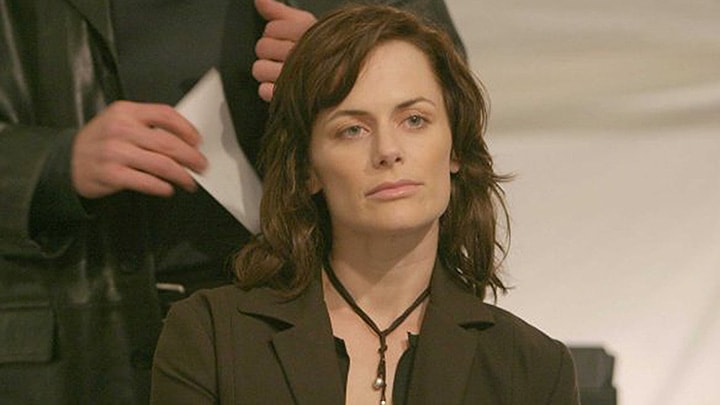 Nina Myers returned to make more trouble
Nina Myers returned to make more trouble
Although the action slows down considerably during the evening hours after Jack arrives in Mexico, they set the stage for a thrilling second half of the season. The auction turns out to be a ruse orchestrated by Amador, whose intention was to sell the virus to another client the entire time. The sting operation is unsuccessful in its goal to secure the virus, the Salazar brothers are killed, and Nina is captured by C.T.U for further questioning.
Continual Momentum
The action subsequently returns to Los Angeles, where the person responsible for the threat is revealed to be former MI6 agent Stephen Saunders. Saunders was a member of the Delta Force team that Jack Bauer led to eliminate Victor Drazen during Operation: Nightfall. Presumed dead, he was instead captured and tortured by the Bosnian secret police for years. The United States refused to negotiate his release.
This backstory is an example of retroactive continuity, but it nonetheless establishes an immediate connection with Jack Bauer and David Palmer. It also links back to season one, the events of which kick-started their respective stories in the series. Saunders uses the virus to hold the country hostage and make demands which includes, among other things, murdering Regional Division Director Ryan Chappelle.
From the moment Saunders is revealed as the mastermind, the narrative gathers continual momentum. The Chandler Plaza Hotel is the first site that Saunders targets in his pursuit of vengeance. Both Gael and Michelle Dessler are among the thousand people who are exposed to the virus. While Michelle eventually discovers that she is immune, Gael quickly starts exhibiting symptoms and ultimately succumbs to the virus.
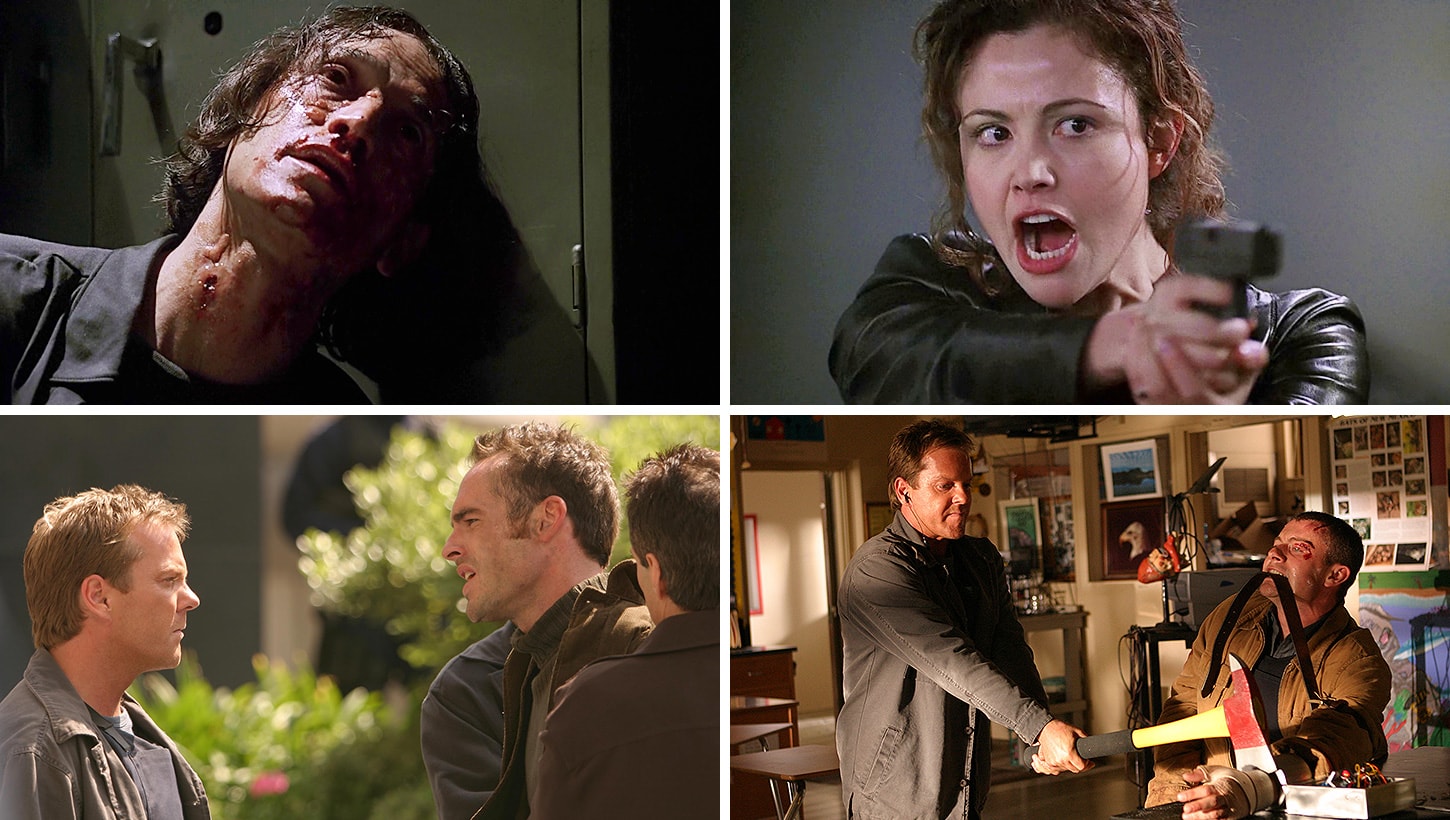 Some highlights of the back half of 24 Season 3
Some highlights of the back half of 24 Season 3
This storyline delivers extremely tense and haunting moments. Among these, Michelle is forced to shoot one of the guests as they try to leave the building and, later, suicide capsules are offered to everyone inside for a less painful death. These are emotionally powerful precisely because they represent one of the few occasions that 24 focuses on how terrorist attacks can affect normal civilians.
The remainder of the season has no shortage of equally powerful scenes. Jack is forced to murder Ryan Chappelle in one of the most disturbing moments of the series and later amputate one of Chase’s hands to prevent the dispersal of the virus in a high school. Michelle is also captured to guarantee the cooperation of her husband in a sequence that closely mirrors what Jack experienced in season one.
Whereas the first half of season three lacks energy and focus, the second half of the season is universally lauded for good reason. From the harrowing Chandler Plaza crisis and the explosive confrontation at the 6th Street Bridge through to the relatively subdued resolution outside St. Thomas Hospital, the second half of the season features some of the most memorable character interactions and action set-pieces of the series.
The Downside
Despite the strength of the aforementioned material, season three is fragmented by myriad subplots that are poorly integrated at best and completely pointless at worst. Whereas the subplots of the first two seasons were salvaged by their thematic relevance, season three has little such luck. They more closely resemble soap opera dramatics, moving from one absurdity to another in an effort to fill out time and give characters something to do.
The interoffice politics at C.T.U are especially tiresome this season. Hostility is exchanged between Kim Bauer and Adam Kaufman for petty reasons while conflict ignites over the romantic relationship between Kim and Chase. Although Kim is better integrated into the action this season, she still feels like window dressing that has a nasty habit of inciting unnecessary drama and getting into trouble.
Meanwhile, Chloe O’Brian is forced to look after a baby in secret for multiple episodes. In addition to her awkward and combative personality, her introduction does not immediately endear her to the audience. In retrospect, it seems extraordinary that Mary Lynn Rajskub’s initially quirky and unlikeable intelligence analyst became the second longest-running character in the series after Jack Bauer.
The political storyline is the most egregious subplot. David Palmer faces yet more scandals, the biggest of which involves his brother and the wife of his financial supporter. This jeopardises his re-election campaign, compelling him to contact Sherry for assistance. Her intervention leads to the death of Alan Milliken, forcing David to cover up the murder and make previously unfathomable compromises to protect both his ex-wife and his brother.
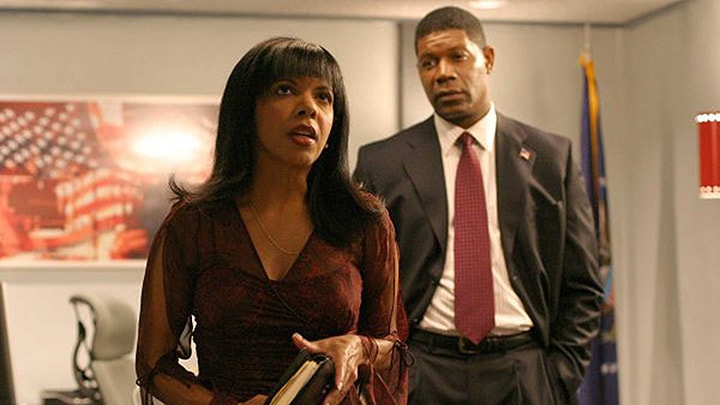 David Palmer seeks assistance from Sherry
David Palmer seeks assistance from Sherry
The situation only continues to deteriorate. David casts Sherry out of his inner circle once again which turns her against him once again. She approaches Senator John Keeler with evidence that implicates Palmer in the cover up, hoping to secure a position in the Keeler administration. When David is blackmailed by Keeler to drop out of the race, he attempts to trick Sherry while Wayne retrieves the evidence from her house.
The political storyline of season three is among the worst of the series, failing to match the quality of the previous season in every conceivable way. Convoluted and melodramatic, the story rehashes the scandals of season one and the treachery of season two without any of the intrigue and with only minimal thematic relevance. Unlike Nina Myers, the contrived return of Sherry Palmer is far less forgivable given the quality of the end result.
The failure to craft a compelling political storyline for Palmer this season may explain why the writing team ultimately decided to withdraw him from the re-election campaign. They may have felt that the story of David Palmer as President of the United States was exhausted, necessitating a change in season four to refresh the dynamics. It is unfortunate that the final appearance of Dennis Haysbert as a principal character was handled so poorly.
Unheroic Heroes
Season three is tonally darker than the first two seasons. By its very nature, the Cordilla virus is chaotic and insidious in ways that even the nuclear bomb of season two was not. Rather than requiring specific components that need assembling and complicated methods of deployment, the virus can be unleashed using relatively innocuous bags of powder. Even the symptoms exhibited by infected characters such as Gael are more viscerally disturbing.
Season three is also thematically darker, featuring characters whose actions are more questionable. For example, Jack is forced to execute an innocent Chappelle to appease a vengeful Saunders and delay the dispersal of the virus. This is one of several major examples where heroic characters are forced to act in ways that are decidedly unheroic, blurring the rules of engagement as well as the boundaries between what is and is not acceptable.
David Palmer is an excellent example of this idea. He engages in uncharacteristically deceitful behaviour, covering up sex and murder scandals to protect members of his family as well as safeguard his chances of re-election. These represent increasingly serious breaches of power that lead to disastrous consequences. Sherry is gunned down by an inconsolable Julia Milliken, who subsequently turns the gun on herself and commits suicide.
The first two seasons portrayed David as a man with unflinching honesty and integrity. Season three corrupts the character, intentionally or unintentionally tapping into the recurring theme of compromise that has become a common denominator for the series. Fortunately, David prevents himself from descending further into self-inflicted oblivion. He withdraws from the election, choosing to uphold his principles rather than maintain power.
Despite his moral fortitude, David demonstrates that he is capable of the very human failings that plague us all, especially in times of crisis. His decision to withdraw from the election not only illustrates his quality as both a leader and a person, but also offers a lesson for everyone in positions of power where compromise can seem so tempting. This is a fantastic moment of idealism in a show otherwise swathed in cynicism.
In a Mirror, Darkly
Season three firmly establishes the mirroring trajectories of Jack Bauer and Tony Almeida. Both are highly capable individuals, both have devoted themselves to protecting their country, both have occupied the position of Special Agent in Charge, and both have been betrayed by a woman they trusted. Their shared experiences have developed an unspoken camaraderie, creating one of the strongest yet most complicated relationships of the series.
Despite these parallels, the fundamental point of difference between the characters is the extent to which their emotions dictate their actions. On one hand, Jack has learned that romantic entanglements can be compromising and that working as a field agent necessitates detachment. On the other hand, Tony struggles to bury his emotions and make necessary sacrifices even when innocent people may pay the price.
Before season three, Tony was mostly a supporting character who provided assistance and intelligence when necessary. He rarely left the office and only occasionally went out into the field. By season three, his direct involvement has become much more prominent. He coordinates a complicated sting operation, suffers a serious injury while tracking down a suspect, and temporarily believes his wife will perish from the Cordilla virus.
His actions also have a larger impact on proceedings. When Michelle is captured as leverage, Tony commits treason by helping Saunders escape the authorities. He tampers with surveillance footage and collaborates with Saunders to facilitate a hostage exchange. This is a direct parallel of season one, in which Jack was forced to compromise his position at C.T.U and cooperate with terrorists to protect his family.
These are watershed moments for Tony, who refuses to sacrifice his wife for the sake of the mission. Jack sympathises, but refuses to endanger millions of lives for the well-being of a single individual. A fiery exchange between the two characters ensues, with Tony berating Jack for failing to save his wife when she was similarly imperilled. These are some of the most compelling scenes of the season, offering excellent drama and character development.
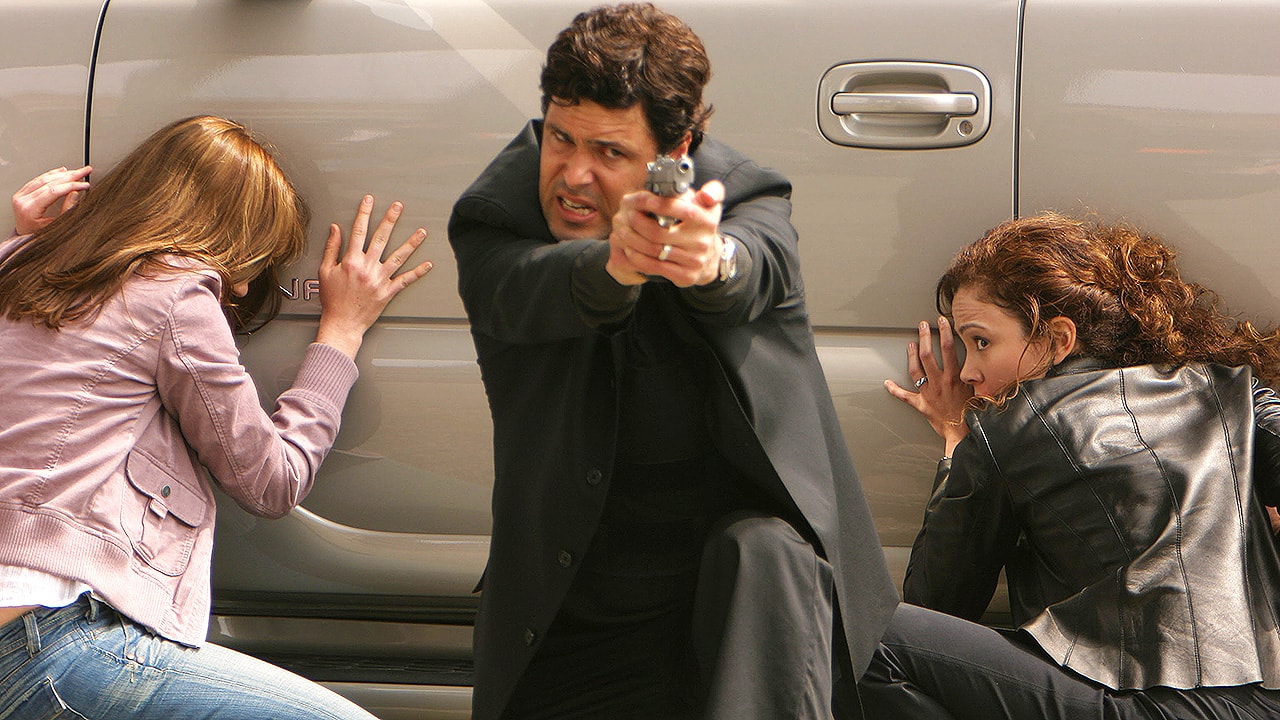
Ultimately, Michelle is rescued and Saunders is apprehended. This does not absolve Tony, who must face the consequences for his treasonous actions. These events lay the groundwork for the next two seasons and set a precedent for the reprehensible actions he commits in season seven. The parallels between Jack and Tony will continue to inform their relationship and their stories for the remainder of the series.
The Denouement
Whereas the first two seasons of the show ended with cliff-hangers, the third season concludes in a much quieter and less dramatic fashion. There are no last-minute twists, no shocking revelations, and no major action set pieces. The biological threat has been contained, the various subplots are resolved, the major villains are eliminated, and the characters reach a natural end point in their current iterations.
These signify both the conclusion of season three and the first trilogy of the series. The shadow of Operation: Nightfall dissipates with the death of Saunders, David decides against running for a second term after recent scandals, Tony ceases working as a permanent agent of the Counter Terrorist Unit after being charged with treason, and Kim completes her transition into adulthood by choosing to leave her father’s immediate sphere of influence.
Furthermore, season three marks the end of Ryan Chappelle, Nina Myers and Sherry Palmer as major recurring characters. Sherry is murdered by Julia Milliken as retribution for her nefarious machinations, which have been mounting for some time. Meanwhile, Nina is fittingly executed by Jack in the same room she murdered Teri several years earlier. Their deaths conclude some of the few story arcs that have continued across all three seasons.
As expected, the final moments revolve around Jack. The last three seasons have taken a tremendous toll on him. When Teri was murdered, he isolated himself from the world and he struggled to reassemble the shattered pieces of his family. Eighteen months later, he was willing to sacrifice himself to save millions of lives but was compelled to continue living and reconnect with his estranged daughter.
But the pain of losing Teri did not subside. While undercover with the Salazar family, he became addicted to heroin not only to maintain his cover but also to bury that overwhelming sorrow. Afterwards, he not only prevents a biological terrorist attack of unimaginable proportions but is forced to murder an innocent colleague and commits a horrible act of violence against his field partner to save lives.
These are just a handful of the hardships Jack has faced in the last five years. In the final moments of season three, their cumulative weight finally catches up to him. Outside St. Thomas Hospital, he breaks down and openly weeps. This is a powerful moment of humanity from a man who has become increasingly disconnected from it. More importantly, it is a much needed moment of catharsis that allows Jack to move forward with his life.
But the story does not end here. Saunders warns Jack that his government will inevitably abandon him, foreshadowing future events where the institutions Jack has loyally serviced and sacrificed so much to protect turn against him. Throughout the second trilogy, Jack will become increasingly disillusioned and his suffering will worsen exponentially as the extent of the corruption around him deepens.
For now, however, Jack can enjoy some relative peace. It will be a long time before things are as good for him as they are now.
He has certainly earned it. ?
About the Author
Bradley Hinds is a professional copywriter and 24 enthusiast. He has a passion for various storytelling mediums, an unhealthy obsession with Pink Floyd, and enjoys writing accessible long-form analysis when he isn’t spending half the day playing a Mass Effect game.
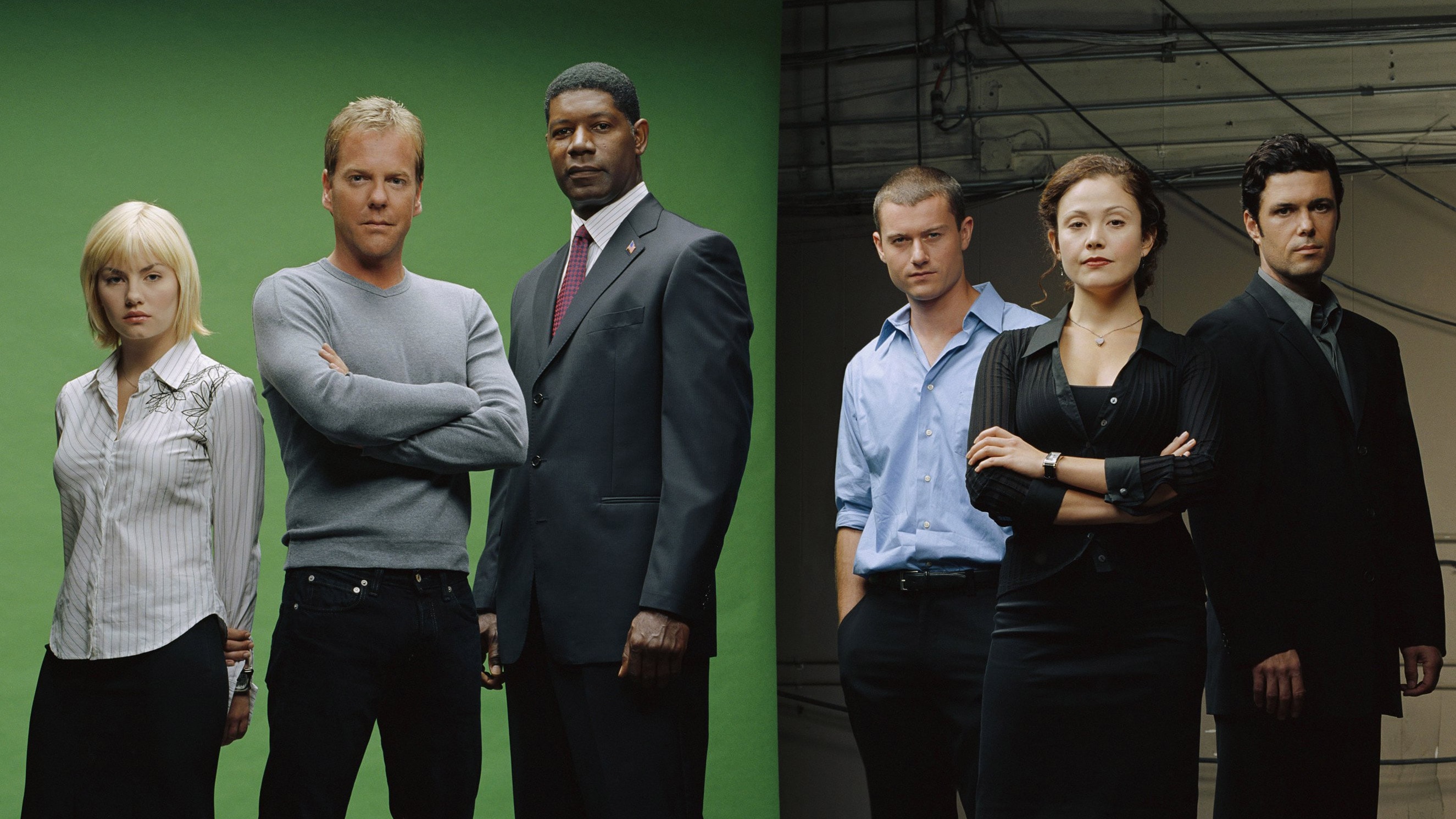
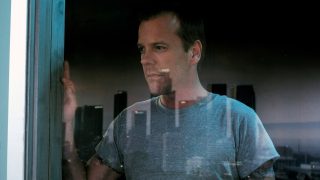
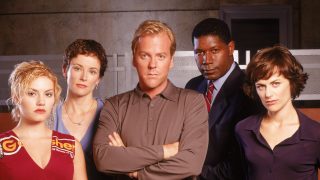
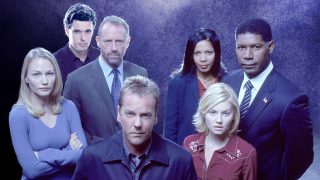
60 Comments
Comments ClosedMichael
July 18, 2017 at 12:02 amMidsomer
July 18, 2017 at 3:54 amBrad
July 18, 2017 at 7:00 amAnd thanks again to our esteemed admin for the work he does on the formatting. :)
Gerry Mander
July 18, 2017 at 8:32 am* I’m not nearly as critical of Day 3 as yourself, because I understand just how difficult it is for the writing team to deliver week-on-week, season-on-season; they have have a whopping eighteen hours of material to deliver in a single year, and in a format (real-time) that makes it twice or three times as challenging to produce because almost every minute has to be accounted for, every character has a rolling story that needs to be forwarded and often interconnected, plus there are absolutely no self-contained episodes whatsoever to give the writers a breather… so I cut them a lot of slack for the occasional subplot that goes nowhere or fills time, as the producers themselves have said; making a season of ’24’ is like building the tracks whilst the train is barrelling down just behind you.
* I’ve always thought of Day 3 very much like Day 8; solid first half, soaring second half.
* If there was ever a good and legitimate reason for making a ’24’ movie whilst the show was still an ongoing concern – and still at the height of it’s commercial zeitgeist – making one that was set between Days 2 and 3 would have been perfect… I don’t think the Max storyline is worth a whole season – probably why the writers abandoned it for Day 3 – but would have been a fantastic premise for a two-hour theatrical feature ultimately shot and released between seasons.
* I think Jack’s emotional moment at the end of Day 3 was to do specifically with that day’s events… it was a genuinely moving insight into the toll each day takes on it’s protagonists, and that hellish day in particular… besides, I’m sure Jack has shed many a tear for Teri before that, don’t you?
Again, great write-up… looking forward to my favorite two seasons coming up next… when the show truly reached it’s zenith.
Brad
July 18, 2017 at 7:26 pmI find season 8 more interesting in totality, with grand thematic statements about the characters and the world of ’24’ which makes the slower first half far more palatable for me. Season 3’s first half is similarly slow, but lacks a degree of relevance in the second half which makes it less effective for me.
I absolutely agree with your point about the movie. It was possibly the perfect opportunity to have the show off the air for a year, giving the creative team time to reinvent the show more extensively. The movie could have established a more interesting reason for Jack leaving or being fired from C.T.U as well.
Yes, of course Jack’s emotional moment was in response to this day’s events, but that doesn’t preclude the events of previous days mounting on top of those hardships. If it were me, I can imagine it would be like a snowball effect.
Mariah Tahmisian
September 15, 2017 at 2:59 pmMilo
July 18, 2017 at 8:43 amBrad
July 18, 2017 at 7:27 pmI’m really not sure yet about Legacy. We’ll see what happens when I finish writing about ‘Live Another Day’.
The Predictor
July 18, 2017 at 9:15 amBrad, I would love for you or anyone else to explain in a logical and plausible way exactly what Jack and Tony’s plan was? The plot of the first 7 episodes was convoluted at best. At worst, it simply makes no sense. The season opens with a dead body infected with a deadly virus being thrown in front of a hospital. If the Salazars didn’t have the virus as we find out later, who was responsible for placing the dead body there? And are we to assume that Jack spent several months working undercover to build a relationship with the Salazars (including getting addicted to drugs) just so that someday months later he might be able to convince them to buy the virus from another group? And in order to make this happen, he had to endanger the lives of dozens with the prison break attempting to get Salazar out of prison. And what adds to this crazy plot line is that Jack is the one who brokers the deal which means he already had an ‘in’ with the ones selling the virus so why exactly did he need the Salazars? Surely, there could have been an easier way…
The writers of ’24’ admitted that in season 3 they wrote themselves into a corner. The hotel episodes were great and the assassination of Chappele was shocking. But overall, this season is one of the weakest.
BDJ
July 18, 2017 at 10:56 amChlojack
July 18, 2017 at 3:30 pmBrad
July 18, 2017 at 7:28 pmI’m not sure I can. It may not be possible to come up with a perfectly logical explanation for the sting operation. In any case, I don’t tend to get hung up on these things quite as much as others do. I appreciated the writers’ attempt to do something quite different and, while far from perfect, I feel it works well enough that it justifies the exercise.
Legacy Survivor
July 19, 2017 at 12:00 amIt’s actually quite impressive that the writers were able to write Jack’s recorded speech to the White House with all relevant events since the premiere relevant to the existence of a sting operation, in an entertaining and succinct way. I would liken it to the beginning of The Fellowship of the Ring movie, where Galadriel talks about the history of the Ring without turning off viewers immediately of this information suddenly thrust upon the audience.
My guess is the writers felt confident enough that they could reveal a true character motivation that was previously written differently because they had pulled it off before, changing the course of character dynamics for the rest of the season. Namely that Nina is the mole in season one and that Marie is the terrorist in season two. Arguably the writers dipped a bit in this trope for season four by revealing Marianne as a mole, but again a positive plot that came out of this was making Curtis a more compelling character. In season five we had of course the “president is the bad guy” reveal and this was probably tied for highest point of this trope with season one. I think this may be in part because the writers revealed new information about what happened before the big reveal – season one being the video footage of Nina killing Jamie but making it look like a suicide, and season five being the voice recording of Logan talking to Henderson on the phone. I commend the writers for going “back in time” essentially and writing these parts, as it really helped the audience accept these plots as plausible.
Of course by this point, this trope is what 24 is known for and seemingly helps the writers fill 24 episodes worth of story, so it continued to be used with characters like Phillip Bauer, Tony Almeida, Dana Walsh and Steve Navarro. The latter two I thought did affect the story in a positive way, the former two not so much.
Sebastian Monroe
July 18, 2017 at 11:47 pmFor the record, I agree with you. I think there surely could have been an easier way. But the easier way would not have made great television. Home Alone would have been much simpler too had Kevin McCallister had an iPhone, but he didn’t, and here we are.
With that being said, I think the only real plot hole is the Kyle Singer storyline – everything else you mentioned could, in my opinion, be explained.
Hector Salazar tells Ramone that “Bauer came to me with an opportunity.” This means that Jack had been in contact with Hector about the virus. This also must have come after Jack made contact with Amador, who had the virus. It’s possible that Jack requested a “sample” from Amador to prove he had the virus, and Jack used the body as a part of the sting operation. Does it make sense? Well, there could have been an easier way, but technically it makes sense.
I also think it’s clear that Jack was never planning to use the Salazars as buyers for the virus from the start. If that was the plan, he never would have broken his cover or gotten Ramone in prison. The virus was a subsequent threat, whereby Jack knew he never would be able to find Amador, buy the virus, or secure the virus unless he posed as a potential buyer (or representative for a buyer). Rather than try and create a fake persona (like Season 8), he suggested the Salazars as potential buyers, hoping that he would be able to reestablish his cover with them. Again, it could have been easier, but that’s how I view it.
Also, if I recall, the prison break was intended to go a lot smoother. I don’t think the intention was ever to cause a riot or for people to be killed. In fact, that’s the only explanation I have for the Kyle Singer story. Jack purposely created false thread to distract CTU, making his escape with Ramone easy. As we know, it wasn’t easy.
Just my two cents.
Mariah
July 18, 2017 at 11:31 amStuart McColl
July 19, 2017 at 5:21 amFantastic articles really love reading them. What is your opinion of the change in Jack in the first 3 seasons? I love Jack in season 1, simply because he was just a normal guy and not ” an agent ” type that he became. Normal clothes, family guy. That is what really got me hooked ( same with everything else in season 1, the setting, the pace, the closeness you felt with the characters. I just dont feel like we know Jack Bauer as much in the first part of season 3.
Brad
July 19, 2017 at 9:17 amI suppose we don’t connect with Jack quite as closely during the first half of season three precisely because his true motivations are kept hidden until the sting operation reveal. It works on some ways and it doesn’t on others, but I find the whole interesting nonetheless.
Brad
July 19, 2017 at 9:18 amThe Predictor
July 19, 2017 at 9:35 am1. Who in their right mind would ever hire Kim Bauer to work in CTU? I know the show just wanted to find a way to keep Kim part of the story but after seeing the way she behaved in the first 2 seasons, there is no way anyone would hire her to work in an intelligence counter terrorism agency.
2. After what occurred in season 2, there is no way that David Palmer would have trusted Sherie to do his ‘dirty’ work.
3. Tony was shot in the neck and he’s back on his feet later that day?
4. The main villain of the season is killed by such an irrelevant character? Talk about being anti-climactic.
5. Chloe and Edgar had a great dynamic in season 4 and 5. In season 3, Chloe and Adam were just annoying.
6. In other seasons, the cliffhangers moments often occurred at the end of the episode so that you would be anxious to watch the next episode. In season 3, many of the cliffhanger moments occurred 2 minutes before the end of episodes and then resolved as the episode was concluding. I don’t know why they did it that way.
Gerry Mander
July 19, 2017 at 10:12 amShe was much missed in subsequent seasons, but her story was probably done by that point.
Mariah Tahmisian
September 15, 2017 at 3:03 pm24marathonman
July 19, 2017 at 5:33 pmRonnieC6
July 20, 2017 at 1:30 pmTJ
July 22, 2017 at 10:03 pmLet’s be honest – in every season she appeared, Kim was window dressing and only existed to serve as the one vulnerability or weak point the villains and people Jack was fighting against could use to leverage him into compromised positions. The character was clearly created for that reason, along with what Kiefer often spoke of about the original storyline (he would fight to rescue the world yet couldn’t manage his own teenage daughter) – and to offer opportunities to show the softer side of Jack as a balance against his otherwise ruthless, unflinching sacrifices of his mission each season.
Maybe it was the rather redundant and formulaic way that Elisha Cuthbert’s limited acting skills portrayed the character but with few exceptions over the series run, every storyline that focused on Kim seemed to be an annoying interruption to the rest of the stories.
I agree with the analysis about the many unnecessary political and interoffice squabble storylines of other characters in S3 – but, seriously, every season of the series had the same formula, only with different actors/characters. I think the writers needed that formula in order to stretch out the seasons to 24 episodes and avoid too much monotony of gunfights, explosions, etc. every episode.
Acer4666
July 23, 2017 at 12:14 pmTJ
July 22, 2017 at 10:15 pm– The hotel setting and suffering of civilians, Gael and Michelle’s torment with witnessing such
– The scenes leading up to the execution of Chappelle: Ryan knowing and fearing its necessity and the anguish that Jack and Palmer had with it
= The cat-and-mouse exchange between Nina and Jack as he tried to keep his cover and motives
– The lines leading up to Jack killing Nina as she connivingly tries to persuade him she has more info and he bluntly answers, “No, you don’t” (as audience reactions go, watching a character everyone loves to hate get their due is always fulfilling – and this scene delivered much like the one when Jack kills off Dana Walsh in S8)
– The scene at the hotel when Jack threatens to send Saunders’ daughter inside
– And obviously the final scene of Jack’s emotional meltdown, which was some of Kiefer’s most powerful acting over the run of the series (especially since we really only saw him have similar moments at Teri’s death in S1; at the nuclear bomb exploding in S6 and the farewell to Audrey at the end of the season; and at Renee’s death in the hospital in S8). His tough and stoic portrayal then made those breakdowns even more poignant because we didn’t see that many “crying” scenes from him.
–
Legacy Survivor
July 25, 2017 at 12:06 amWill you be doing a review of the 24: Legacy Blu-ray/DVD and if so when will it be published here?
Thanks.
24 Spoilers
August 9, 2017 at 12:56 pmI’ve reached out to several people at Fox over the last few weeks and they had no idea what the release plans are either. One of the major retailers (Best Buy) has deleted their listing for it and Amazon seems to have deleted the Blu-Ray listing as well. So I dunno, I’m starting to think they’re just not going to release it here at all. *shrugs*
I know it’s out in UK and Japan though, but from what I’ve heard, it’s the most barebones low-effort release yet with just a single 10 minute featurette of Evan and Manny talking about bringing the show back and a couple of deleted scenes. So it’s not even really worth reviewing anyway.
Vaughn Ramdeen
July 26, 2017 at 10:11 amMariah Tahmisian
September 15, 2017 at 3:05 pmD.Davis
July 26, 2017 at 9:05 pmKud0
July 27, 2017 at 7:40 amJohn Newhouse
July 27, 2017 at 5:19 pmPoint one: It would be only natural that the characters change, harden and adapt their behavior and even core beliefs to the changing world and threat level as it has escalated since 9/11 both in the fabric of real life in daily America as well as in the evolution of the tv show.
Point two: Don’t forget that each season of 24 is only a one day snapshot, so the fact that certain character traits weren’t revealed or at least entirely evident in season one and two, doesn’t mean that those traits didn’t already latently exist. Character development over the period of several seasons is quite fine considering the 24 format.
I do appreciate your thoughtful analysis. I disagree with you (I believe season 3 was one of the top three seasons), I am also a huge fan of 24, and with the exception of season 8 thoroughly enjoyed all other seasons, I do still appreciate the enthusiasm and differing perspective of another fan … so thanks!
Brad
July 28, 2017 at 9:49 pmDon
August 7, 2017 at 12:32 pmLoved Ramon Salazar.
Chlojack
August 8, 2017 at 1:27 pm@TMSJay
#24 could live on at @FOXTV. “Very early” talks already have started on its next possible iteration. #TCA17 @24fox
@jasonlynch
Fox exec David Madden said the next version of 24 probably won’t take place at CTU. #TCA17
Diane Gordon @thesurfreport
David Madden: the next version of 24 probably won’t be CTU. We’ll use ticking clock in another situation. #TCA17 #FOX
@debrabirnbaum 5m5 minutes ago
#FOX chair Dana Walden on #24: It could live on in an anthological way… [The EPs] have an exciting idea that’s compelling. #TCA17
Additional info can be found here:
https://twitter.com/search?f=tweets&vertical=default&q=%23tca17%2024&src=typd
Chlojack
August 8, 2017 at 2:39 pmhttp://tvline.com/2017/08/08/24-reboot-no-jack-bauer-ctu/
Big Boss
August 8, 2017 at 7:41 pmGood lord I just cannot get enough of this woman’s mealy-mouthed nonsense. Repeating the lie about how they just had to let the main actor go be on Broadway and now claiming the critical bomb that got CANCELED after a Super Bowl lead-in “whetted” people’s appetites. How does she still have a job?
I find it very interesting though that Howard Gordon and Brian Grazer – and JOEL SURNOW!!! are involved with no mention of Coto or Katz. Only reason I haven’t written this off already…
David
August 20, 2017 at 3:57 amWhen will we have Season Four’s text? Looking forward to it!
Brad
August 20, 2017 at 8:59 amI’ve been struggling to get the next article right. I’m still working on it and I hope to have it finished before the end of the month.
David
August 20, 2017 at 9:52 amAnde
September 15, 2017 at 3:06 pmLooking forward to reading about season 4 review. Getting little impatient because it was such a good read for the rest of the seasons. When can we hope to have it published?
Thank you.
Brad
September 16, 2017 at 9:38 amMy sincere apologies for the wait. Most of the next entry has been drafted, but it is not in a state that I’m willing to publish. I try to maintain reasonably high standards with my work, more for myself than anyone else. I’m honestly not sure when I will have it finished, but it will be.
The disappointment of Legacy and the lack of news about 24’s future has diminished my enthusiasm a bit,
but I’m committed to seeing this entire project through from start to finish. If it eases your anticipation, I’ll probably be posting season four and season five at the same time.
Thanks for your continuing interest! :)
Ande
September 16, 2017 at 12:59 pmAlso, I am interested if you think that since it was known that Kiefer wont be back as Jack, the best way to continue the franchise would have been to make another couple of seasons with Tony as the male lead, since there was huge potential in that storyline with his redemption and so…
I really think they blew their chance with him in Legacy by giving him that story and limited screen time…
Best regards,
Brad
September 17, 2017 at 4:42 amBravesfan
August 28, 2017 at 9:26 pmBravesfan
August 28, 2017 at 9:29 pmKarl
September 8, 2017 at 11:01 amDay 3 is not flawless but the second half is so thrilling and amazing that it really worthed it!
JackBauerAttackHour
September 19, 2017 at 1:05 pmBrad
September 19, 2017 at 9:26 pmAs I said above, I’m not entirely sure when the next review will be finished. I’ve been taking a break recently, having worked on these articles for a few months straight earlier in the year. It’s more work than you might think, especially to get them to a state I’m reasonably happy with (and I’ve learned I’m always never completely satisfied). Plus, I work as a copywriter 8 hours a day 5 days a week. Extra writing activities like this can be difficult to fit in when you’re already mentally drained.
I’m making a lot of excuses here, but rest assured I haven’t abandoned these. Not by a long shot. I’m just taking a break to maintain the quality I expect from myself. :)
Ande
October 28, 2017 at 6:55 amAny news about the Day 4 article?
Sincerely,
Brad
November 2, 2017 at 1:53 amNot much new to report. I’m going to try and finish the next two before the end of the year and work on the second half of the series early next year. Sorry about the significant delay.
Adwait Deshpande
October 29, 2017 at 2:52 amBrad
November 2, 2017 at 1:52 amMariah Tahmisian
November 1, 2017 at 5:54 pmAnde
December 24, 2017 at 1:50 pm2018 is almost upon us, can we have a New Year’s present in the form of Day 4 article?
All the best.
Sincerely,
Ande
Mariah Tahmisian
February 20, 2018 at 5:44 pmMilo
April 17, 2018 at 4:53 pmMilo
April 29, 2018 at 4:18 pmMeg
January 2, 2019 at 8:31 pm